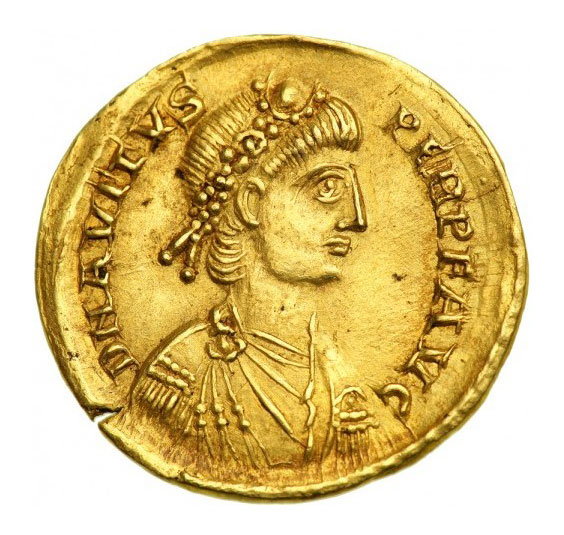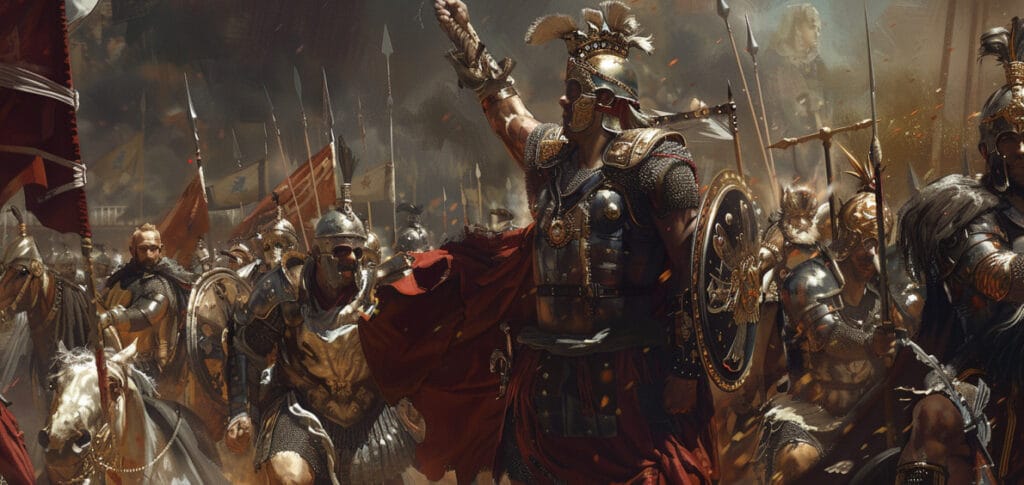Life: AD ? – 455

- Name: Marcus Maecilius Flavius Eparchius Avitus
- Born in Gaul.
- Consul AD 456.
- Became emperor 9 July AD 455.
- Died on way to the Alps from Placentia, AD 456.
Avitus was the son of a rich and distinguished family from the Arvernian region in Gaul.
He first had studied law but soon dedicated himself to a military career instead where by AD 437 had achieved the rank of ‘Master of Soldiers’ and became praetorian prefect for Gaul.
His Gallic connections served Avitus very well. In the war with Visigoths, it was Avitus who in AD 437 brought about peace between the two sides. In doing so he befriended the Visigoth king Theodoric I, over whom he enjoyed substantial influence thereafter.

In AD 451 Avitus helped persuade Theodoric I to join with Aetius in fighting Attila the Hun – an alliance which led to the outstanding victory over the Huns on the Catalaunian Plains (Châlons).
Theodoric I was killed in the battle, but his son and successor Theodoric II by that time also was a close friend of Avitus.
In AD 455 Petronius Maximus recalled Avitus out of retirement to once more hold the rank of ‘Master of Soldiers’. But this offer came to nothing as this emperor soon later met his violent death.
However, the news of Petronius Maximus’ death reached Avitus, as he was a guest at the court of Theodoric II in AD 455. Theodoric II at once urged him to take the Roman throne. Avitus at first was reluctant to do so, but eventually accepted the proposal.
A meeting of senators was called at Ugernum (Beaucaire) where Avitus was proclaimed Augustus.
More significantly perhaps, on 9 July AD 455, Avitus was hailed emperor by the army. Thereafter the final step in Avitus’ accession to the throne was that Marcian, the emperor of the east, also recognized him.
Only later that year did Avitus actually travel to Italy to assume his throne.
On 1 January AD 456 he took up the office of consul.
But a large faction of the Roman senate strongly disapproved of having a Gallo-Roman on the throne. Not only had their consent not be sought, but their new emperor owed his accession more to the Visigoths than to anyone else.
Yet a far greater problem at that time was Geiseric, who had, after sacking Rome, remained as hostile as ever and had even left behind a fleet to dominate the coasts of the empire.
In order to deal with the Vandal problem Avitus appointed a Sueve called Ricimer as ‘Master of Soldiers.Ricimer owed this promotion most likely due being the maternal grandson of Wallia, the former king of the Visigoths. But Ricimer was indeed not without ability. In Siciliy he repelled a Vandal landing at Agrigentum (Agrigento). Then, in AD 456, he won a naval battle off Corsica.
While these successes stunted the Vandals, Avitus’ ally Theodoric II with his Visigoths crushed the Sueves in Spain. Avitus himself was himself not idle and took to the field in Pannonia.
But all the while in Rome resentment toward the ‘foreign’ emperor grew.
Worse still, the domination of the sea by the Vandal fleet stopped much of the city’s grain supply from getting through. A famine loomed over Rome, as stocks quickly depleted. Avitus tried his best to at least reduce the numbers of people to feed, by dismissing the Gallic and German troops whom he had brought with him to Rome.
But for this the troops needed to be paid off. Money was scarce and hence some of the city’s bronze statues were sold to raise the funds. An action which had the ‘foreigner’ Avitus, in the eyes of many Romans, selling Rome’s heritage.
Alas, Ricimer returned to Rome and, together with the senate, deposed Avitus.
Most likely Ricimer, who by now was the real power in the western empire, simply didn’t want to endanger his own powerful position by associating himself with such an unpopular emperor.
But then so too is it possible that Ricimer, a Sueve after all, resented the crushing defeat of the Sueves in Spain by Theodoric II on Avitus’ behalf.
Avitus attempted to flee to Gaul with his guard, but they were defeated and he was captured near Placentia (Piacenza). In October AD 456 Ricimer tried to settle matters by granting the deposed emperor the position of bishop of Placentia.
Though Avitus soon after learnt that the senate had ordered his execution. He fled toward the Alps, seeking to cross into his homeland of Gaul, hoping to find refuge there.
But on the way he died, either from plague or by assassination.

Historian Franco Cavazzi dedicated hundreds of hours of his life to creating this website, roman-empire.net as a trove of educational material on this fascinating period of history. His work has been cited in a number of textbooks on the Roman Empire and mentioned on numerous publications such as the New York Times, PBS, The Guardian, and many more.
